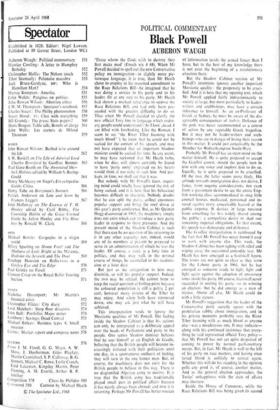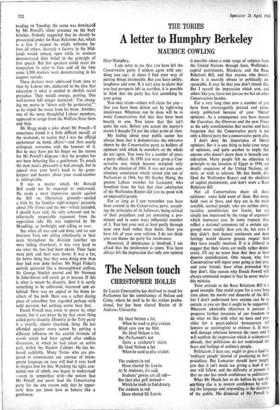Black Powell
POLITICAL COMMENTARY AUBERON WAUGH
`Those whom the Gods wish to destroy they first make mad' (Enoch xix 4 68). When Mr Powell decided to spell out the new Conservative policy on immigration—in slightly more pic- turesque language, it is true, than Mr Heath chose to employ in his reasoned amendment to the Race Relations Bill—he imagined that he was doing a service to his party and to his leader. Or at any rate to his party. Mr Heath had shown a marked reluctance to oppose the Race Relations Bill, and had only been per- suaded with the greatest difficulty to do so. Thus when Mr Powell decided to clarify the new official Tory line in language which ordin- ary people could understand ('As I look ahead, I am filled with foreboding. Like the Roman. I seem to see "the River Tiber foaming with much blood"'), he knew that he could not be sacked for the content of his speech, and may not have expected that an important Shadow minister could be sacked for tone. In any event, he may have reckoned that Mr Heath (who, when he dies, will almost certainly be found to have 'party unity' engraved on his heart) would think it too risky to sack him. And per- haps, in time, we shall see that it was.
But nobody with Mr Powell's keen, inquir- ing mind could totally have ignored the risk of being sacked, and it is here that his behaviour becomes difficult to interpret. Nobody doubts that he can split the party, collect enormous popular support and bring the roof down at this year's party conference. But, as Mr Quintin Hogg discovered in 1963, the machinery simply does not exist which can introduce a new party leader in response to these pressures. And the present mood of the Shadow Cabinet is such that there can be no question of his returning to it in any other capacity; nor, indeed, would any of its members at present be prepared to serve in an administration of which he was the leader. Of course, a week is a long time in politics, and they may well, in the normal course of things, be reconciled to his readmis- sion at a later date.
But just as the antagonism to him may diminish, so will his popular support. Indeed, the two may be related. He cannot hope to keep the racial question at boiling-point because the coloured population is still a paltry 2 per cent, however many visions of the Tiber he may enjoy. And when both have simmered down, one may ask just what he will have achieved.
This interpretation tends to ignore the Messianic qualities of Mr Powell. The feeling inside the Shadow Cabinet is that his actions can only be interpreted as a deliberate appeal over the heads of Parliament and party to the people. One senior Shadow minister believes that he sees himself as an English de Gaulle, believing that the British people will become in- creasingly irritated with their politicians until one day, in a spontaneous outburst of feeling, they will turn to the one honest man. But, of course, the machinery does not exist for the British people to behave in this way. There is no disgruntled Algerian army to mutiny. It is true that the British army has traditionally played small part in political affairs because it has nearly always been abroad; and now it is returning. Perhaps My Powell has better sources of information inside the armed forces than I have, but to the best of my knowledge there is not even the beginning of a revolutionary situation there.
But the Shadow Cabinet version of Mr Powell's intentions ignores another important Messianic quality : the propensity to be cruci- fied. And it is here that my opening text, which Mr Powell applied fairly indiscriminately to society at large, but most particularly to leader- writers and archbishops, may have a certain relevance to himself. As an ex-Professor of Greek at Sydney, he must be aware of the dis- agreeable consequences of hubris. Defiance of the gods was never recommended as a course of action by any reputable Greek tragedian. But it may not be leader-writers and arch- bishops who are in danger of losing their reason in this matter. It could just conceivably be the Member for Wolverhampton South-West.
Probably Mr Powell has an open mind on the matter himself. He is quite prepared to accept the Gaullist crown, should the people turn to him with one voice and implore him to do so. Equally. he is quite prepared to be crucified. Of the two, the latter seems more likely. His attitude towards immigration does not derive, I fancy, from eugenic considerations, nor even from a passionate desire to see the entire Eng- lish working class accommodated in snug little council houses, medicated, pensioned and in- sured against every conceivable hazard at the public expense. It derives in large measure from something far less widely shared among the public: a compulsive desire to shed our remaining imperial obligations. To that extent, his speech was demagogic and dishonest.
The Gaullist interpretation is reinforced by the fact that Mr Powell has never found it easy to work with anyone else. This week, the Shadow Cabinet has been sighing with relief and wiping away the occasional crocodile tear. Mr Heath has now emerged as a Gaitskell figure. The issues are not quite so clear as they were for the Labour party in 1961, but he has emerged as someone ready to fiat, fight and fight attain against the adoption of unsavoury tones inside his party. Of course, Gaitskell never succeeded in uniting his party —or in winning an election--but he did emerge as a man of stature. Above all else, Mr Heath could do with a little stature.
Mr Powell's suggestion that the leader of the Conservative party secretly agrees with the proletarian rabble about immigration, and in his private moments probably sees the River Tiber foaming with as much blood as anyone else—was a mischievous one. It may indicate— along with his continued insistence that every- thing he said represented official Tory policy— that Mr Powell has not yet quite despaired of coming to power by normal parliamentary means. But, in fact, Mr Heath is well to the left of his party on race matters, and having once tasted blood is unlikely to retreat again. Whether this will do his standing in the opinion polls any good is, of course, another matter. And as the general election approaches, the Tories' unhappiness with the state of affairs may increase.
Inside the House of Commons, while the Race Relations Bill was being given its second
reading on Tuesday, the scene was dominated by Mr Powell's silent presence on the back benches. Nobody suggested that he should be prosecuted under the Race Relations Act, which is a fate I suspect he might welcome be- fore all others. Scarcely a factory in the Mid- lands would remain open while its workers demonstrated their belief in the principle of free speech. But few speakers could resist the temptation to' refer to him, and all the time some 1,500 dockers were demonstrating in his support outside. These dockers were addressed from time to time by Labour MPS, dedicated to the idea that education is what is needed to abolish racial prejudice. They would emerge, panting. One well-known left winger muttered : `I'm chang- ing my motto to "down with the proletariat,"' as he wiped the sweat from his brow. Another, one of the more thoughtful Labour members, appeared to resign from the Welfare State there and then.
Mr Hogg made a joke about Mr Powell-1 sometimes found it a little difficult myself, at the weekends, to realise that I was the official spokesman on home affairs'—and then nearly collapsed, overcome with the humour of it. But he may have put his finger on the reason for Mr Powell's disgrace—that the prophet has not been behaving like a gentleman. To poach • the next man's pheasants is bad enough, but to appeal over your host's head to the game- keepers and beaters about your stand-number is unforgivable.
It was a matter which Mr Ronald Bell could not be expected to understand. He made a most impressive speech against the Bill on libertarian grounds—spoiled a little by the familiar right-wingers' paranoia about The Times and the BBC—which included, I should have said, the only coherent and in- tellectually respectable argument from the opposition side. He was supported by Mr Maudling, as forthright and telling as ever.
But when all was said and done, and we saw fourteen Tory mrs sitting rebelliously in their seats throughout the division (another ten were hiding elsewhere), it was very hard to see what the fuss had been about. Their faces were pink and their eyes shone. It was a far, far better thing that they were doing now than they had ever done before. Mr Nigel Fisher's nostrils quivered like a thoroughbred stallion, Sir George Sinclair purred and Mr Norman St John-Stevas will surely go to heaven. If this is what is meant by disunity, then it is surely something to be cultivated, treasured and ex- hibited. Here was no appeal to the brute in- stincts of the mob. Here was a rather daring piece of schoolboy fun, regarded perhaps with mild derision, but nothing worse than that.
Enoch Powell may come to power by other means, but it can never be by that sweet thing called party disunity. Disunity in the Tory party is a courtly, almost ritualised, thing. He has offended against every canon by putting a different inflexion on the careful formula of words which had been agreed after endless discussion, in which he had taken an active part, within the Shadow Cabinet. He has be- haved caddishly. Many Tories who are pre- pared to countenance any amount of intem- perate language on race will find it very hard to forgive him for this. Watching the tight, con- tented row of rebels, one began to understand —even to sympathise with—the notion that Mr Powell can never lead the Conservative party for the one reason only that he appar- ently does not know how to behave like a gentleman.







































 Previous page
Previous page